This is a story about my grandfather, who doesn’t quite fit the typical “gentle grandpa” mould. We weren’t particularly close; I didn’t visit him often, and he rarely came to see us either. Grandpa Yanyk just lived his life quietly in our neighbourhood of Stare Misto in Vinnytsia [city in Central Ukraine – ed.] – he just existed. It wasn’t until I was in elementary school that I fully understood he was my grandfather and that Grandma Lina, his wife, was my grandmother. My perspective on him shifted when my family and I moved into his house to wait out the first few weeks of the full-scale Russian invasion. This piece is a snapshot of my grandfather Yanyk’s life and his curious detachment from the unfolding war.
Our family car, an old Soviet Lada, wasn’t built to be packed with supplies and navigating through Vinnytsia, especially not in a country under martial law. It was my first time driving on these eerily silent yet strangely “resonant” streets—still paved with asphalt, at least for now.
With my parents, my friend Yana, and me in the car, there was little conversation. We weren’t sure what people normally say to each other when a full-scale war breaks out. Instead, our heads were spinning, nausea rising in our throats, and our ears ringing with the collective tension. Anxious thoughts whirled as we anticipated an explosion just ahead as if the sky might suddenly fall on the entire country (isn’t that what happens in war?). It felt like anything could trigger catastrophe with a single misplaced breath. The road itself may not have been “resonant,” but our minds certainly were charged with collective fear and uncertainty.
Like a vigilant sentinel, the car’s grimy window stood between us and the suddenly hostile world outside. Yet, like a conscientious warrior, it didn’t shield us from the truth but revealed it: familiar apartment blocks, Checkpoint 1, Checkpoint 2, the bustling people, and the chaotic traffic. They, too, feared the sky might collapse upon them, seeking refuge in their homes or cars, grasping at the illusion of safety for fleeting moments. In times like these, a “shelter” offers a semblance of control and security, momentarily easing the anxiety. It’s reminiscent of childhood, darting from the bathroom to your room in the dark, evading imagined monsters, and finally finding solace under the blanket where no monster can reach. But on February 24th, there was no luxury of complete calm; the anxiety persisted. In those first few seconds of seeking refuge, the urgency of survival gripped everyone once more.
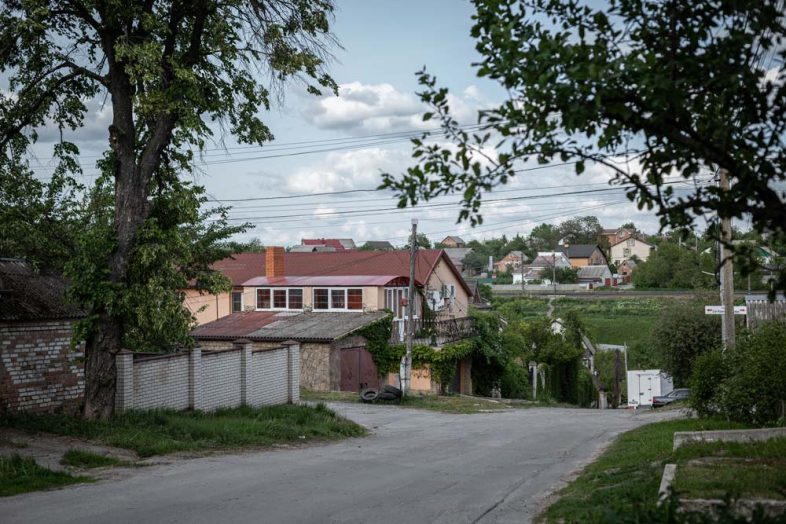
Photo: Polina Kovalska
The road gradually turned greyer, its dust and occasional, even greyer gravel crunching under the wheels. The heads of the four people in the car lifted slightly, surprised not to hear the expected sound of thick, broken glass. Their eyes brightened, losing their glazed look to focus on the crunching of grey pebbles under the wheels. This road seemed to have more pebbles than the rest of Vinnytsia, marking our arrival in the Stare Misto district.
Above, the sky took on an even more pronounced grey colour with various gradients, spots, and patterns. The atmosphere here was different—no bustling people or congested traffic jams. The streets lay empty except for a few women of different ages walking to and from the well with buckets. As the car’s passengers breathed a bit easier, the tension in the air eased. There was no longer a need to calculate the right moment for the next breath.
Through the window, the residents of Vinnytsia’s Stare Misto revealed their predominantly private houses, each with its own gardens, cellars, and storage rooms—a comforting sight amidst the turmoil of war. Some lived in ‘palaces’ frozen in Soviet-era interiors, experiencing a sense of detachment and illusion in this old town ‘Land of Oz’. My grandfather Yanyk was among these resilient souls.
The grey gravel road finally led us to my grandfather’s house at 20 Odeska Street in the Vinnytsia’s Stare Misto district—a quintessential embodiment of the area’s muted atmosphere, a ‘palace of oblivion’. Surrounding the house was a dilapidated, rather tall fence painted in a dark green typical of Khrushchev and Stalin-era buildings. The bare, gnarled branches of three old apple trees, a walnut tree, and grapevines further accentuated the pervasive grayness of the landscape.
The gates, shut and locked, protested with an irritable squeak as we tried to move it; its locks rusted with neglect.
“DAD!” my father called out, breaking the silence. We waited, two minutes passing in silence.
“DA-A-AD!”
From afar, we heard a raspy voice and muttering. Then, a short, frail-looking man with a reddish face shuffled towards us with surprising energy. He wore a flat old cap, a cracked unbuttoned coat revealing a worn sweater adorned with three diamond-shaped patches on the chest, and dirty rubber boots—all cloaked in dark grey tones. Perhaps once black, the clothing now seemed layered with dust.
Grandfather smiled broadly, squinting his eyes almost shut. The smile, unnaturally frozen on his face, revealed surprisingly good teeth, likely more a testament to his dentures than to his own. His lips folded inward slightly without teeth, but that day, Yanyk greeted us “in full dress,” proudly wearing his dentures.
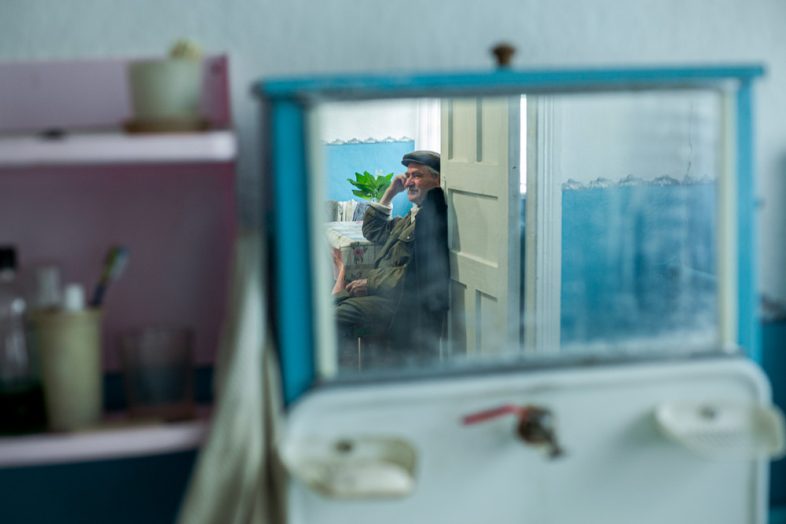
Photo: Polina Kovalska
“Just arrived!” he announced to his son, his voice raspy yet full of energy.
With rough, dry hands adorned with dirty nails, he opened the gate and stepped out to meet us, eagerly anticipating a conversation with my dad, still unaware of its nature.
“And Lena! And the girls… Ah, I don’t know this one…”
“Dad, are you even aware that a war has started?”
“WHAT?” Grandpa’s voice became even raspier and, for some reason, comically surprised, as if he was hiding laughter behind feigned astonishment. But at the same time, the laughter wasn’t intentional. Yanyk raised his thick grey eyebrows almost to his hairline without removing his smile. This made his eyes clearly visible: hazy blue, also with a veil of cartoonish surprise.
“You’ve already had a drink, haven’t you?” my mom asked her tone a mix of concern and resignation.
Dad and I stood amidst our belongings while my friend Yana looked on, clearly taken aback by the question. She later confided in me during the summer of 2022 that our grandfather seemed a bit unsettling to her.
“Just a little!” Grandpa replied, his expression unchanged. He seemed slightly embarrassed as if caught off guard, hunching his back and pulling his shoulders forward, his neck drawn back, and his hands resting with open, weathered palms facing downward.
Our grandfather was a drinker, yet he somehow managed to maintain the house and the outbuilding, feed the dogs, visit neighbours, and even cycle to the market. Oblivious to most world events and the lives of his children and grandchildren, he never favoured my father, so my sister Yulia and I rarely spent time with our grandparents from Stare Misto (my grandmother had passed away).
Yulia and I were strangers to them, recognised only by sight. Occasionally, they still referred to one of us as Evelinka, the name of their favourite granddaughter, the daughter of my father’s beloved younger brother, Yurasko. Despite this, Grandpa always handed out money to all his grandchildren when we visited: 100 hryvnias for the younger ones and 200 for my older sister. It was his way of maintaining a rough kind of equality, tinged with the smell of alcohol—a fitting demeanour for a staunchly Soviet-influenced Ukrainian, albeit not entirely Ukrainian nor entirely pro-Soviet, truth be told.
“When they were issuing my passport, they [Soviet authorities – ed.] said there’s no such name in the Soviet Union as ‘Yanyk.’ They only know ‘Ivan,’ so that’s what they wrote down!” Grandpa told my friend Yana, whom he met on that hysterical February day.
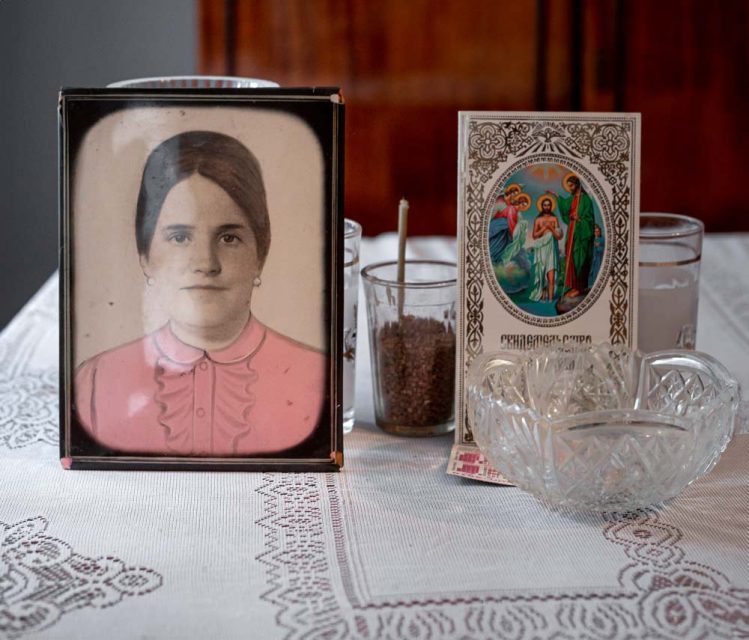
Photo: Polina Kovalska
Jan Karolevych Kovalski, a Catholic of Polish descent, was born on a farmstead deep in the forests near the village of Turbiv in the Vinnytsia region. The farmstead, once a community of 12-15 houses in his grandfather’s time, has now vanished; we visited its remnants. Only a cemetery remains, dotted with old Polish and Jewish graves, alongside newer ones bearing Ukrainian inscriptions. Descendants of the farmstead’s inhabitants still visit this secluded forest spot, honouring their parents’ final wishes and gathering there on Easter and Remembrance Day.
Grandpa had expressed his wish to be laid to rest here alongside his parents, Maria and Karol Kovalski. However, fate intervened when his wife, my grandma Lina, passed away earlier and was interred in a different cemetery in Vinnytsia. Not being from the farmstead herself and Orthodox rather than Catholic, my mom questioned Grandpa about his plan to be buried in the forest cemetery, given Grandma’s resting place in Sabariv cemetery.
“Eh, true! Then I’d rather lie next to Lina!”
We were already seated in the chilly house, surrounded by a typical Soviet interior: light blue walls in the hallway, a small varnished table with a ‘kleyonka’ [plastic tablecloth – ed.] on top, and four varnished stools with red covers adorned with white flowers.
In the kitchen, a vintage Soviet gas stove stood with a worn kettle sporting black stripes on its edges. The sink required a bucket underneath to catch dripping water, and pulling the plug upward was necessary to make it flow.
The largest room was dominated by shades of red: a chintz carpet with black threads, a creaky sofa and two armchairs, their covers depicting milky, schematically drawn flowers against a crimson background. Red-black-brown carpets adorned two walls, complementing a large, polished brown wood sideboard that absorbed and reflected the room’s red hues like a mirror. A table and cabinet of the same material stood nearby, housing a boxy grey television. A touch of modernity amidst Soviet authenticity—a blue sofa from our old apartment now resided in Grandpa’s house.
Mentally, Grandpa remained rooted in that far-away Soviet era. He acknowledged Ukraine’s independence, yet his fondness for the Soviet times persisted: “The state provided everything, there was work, and prices were reasonable.” He didn’t advocate a return to the Soviet Union; Yanyk just naively believed life was better back then, without any desire to influence current events or decisions in the country.
A quintessential “little man” from the harsh Soviet era, Grandpa Yanyk seemed adrift in the currents of time, burdened by irretrievable years and surrounded by the musty smell of his equally weathered home. The faint aroma of cigarette smoke lingered around him, a distinctive marker.
During the few visits we made, I vividly recall Grandpa airing his grievances to Dad about the latest news from TV or radio, alongside his personal woes, like the inadequacy of his pension. Each complaint culminated in a frustrated declaration: “And the government does nothing!” Dad attempted practical suggestions, like advising Grandpa not to financially support his younger son, who had a stable job and his own home. Yet Yanyk saw no power in altering his habits to improve his own circumstances. He always countered defiantly: “So what am I supposed to do!? Isn’t it the government’s responsibility to ensure a decent life for its people!? Am I supposed to fix it!?”
Likewise, when advised by the doctor to adjust his diet due to health concerns, he bemoaned the high cost of medications: “If only the government set fair prices! For medicines and groceries! What am I supposed to do!?” Dad’s suggestion to cut down on sausages and bacon in favour of more vegetables met with similar resistance. Thus, we began periodically bringing groceries to Grandpa, as financial assistance was off the table—he insisted on supporting his younger son.
On one hand, it paints a poignant picture; on the other, it’s a predictable outcome. After all, someone who moved from a village to the city in search of work, later receiving land and steady employment from the state, along with education for his children, naturally expects continued “blessings from above”.
Yanyk’s belief in “developed socialism” came easily, shaped by his early life near Turbiv, where he fetched water from a well, cooked over a stove, and attended a few classes near the church before an incident led to his expulsion (as far as he could recall).
During the Soviet era, he was given a passport, land, job security, healthcare, and free education for his children. It’s common for individuals to linger in the perceived prime of their lives mentally, anchoring their expectations on that period. For Grandpa Yanyk, that golden era was Soviet Ukraine.
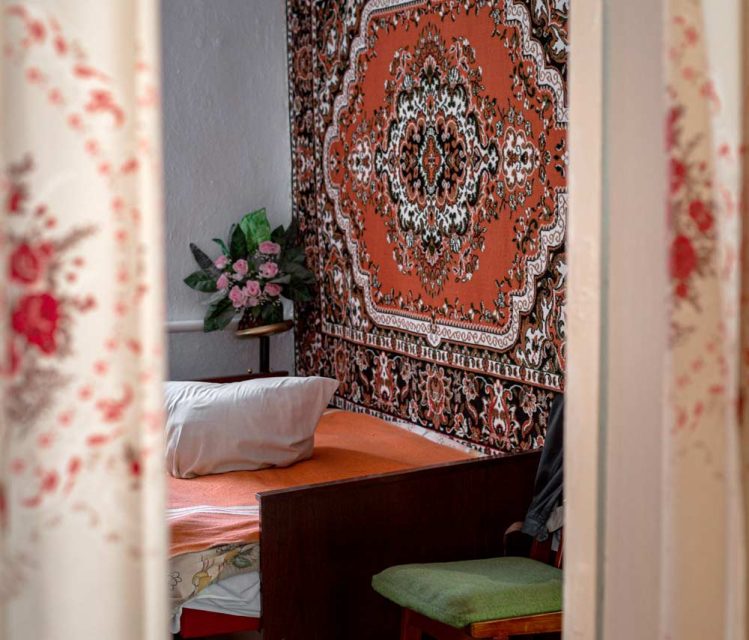
Photo: Polina Kovalska
After the flurry of settling in—rearranging belongings, distributing groceries, and finding sleeping spots—Yana and I nestled on the couch, huddling close for warmth because Grandpa kept the house chilly. My mom noticed this and brought over an old, scratchy, woollen blanket adorned with faded abstract patterns. She draped it over us, her expression a mix of sadness and nurturing murmurs. I sensed she was holding back tears, knowing that children, hers and others, must endure during times of full-scale war, facing an uncertain future.
Mom settled onto another couch beside Dad. He was accustomed to processing emotions quietly, his demeanour somewhat reserved but always attentive to everyone’s well-being. He checked in, asking if everything was alright and if we needed anything. They sat together, holding hands; Mom rested her head on Dad’s shoulder, and he covered her with another blanket.
Grandpa joined them on the couch, seating himself at the opposite end. After a few moments of silence, he sighed deeply and asked, “Are the Germans attacking again?”
“No, Dad, it’s the Russians,” my dad replied calmly.
“The Russians!?” Grandpa exclaimed, incredulous.
“Yes.”
“How’s that? They were our allies, and now they’ve attacked? Damn! Just look at them!”
Grandpa hadn’t fought in the Second World War, known in the Soviet Union as the “Great Patriotic War.” He had served in Siberia, where he acquired his “tattoos”—remnants still visible under the weathered skin of his hands, marked by years and dirt.
In the initial days of uncertainty, amidst collective hysteria and fear of marauders and the rapid advance of Russian troops, many local residents prepared Molotov cocktails just in case. We were among them, using beer and wine bottles brought by my uncle Sergiy, lining them up in a corner of the entryway.
With no small children to worry about the accessibility of the Molotov cocktails, our concern focused more on our grandfather, who was a drinker. Despite informing him about the onset of full-scale war, his routines remained largely unchanged. We found ourselves supervising him like a child, patiently explaining multiple times what was now permissible and what wasn’t.
For instance, when Yanyk insisted on going to the market on the third day of the invasion, we collectively explained that he was unlikely to find anyone there.
He joined us in the cellar twice during night alarms but adamantly refused afterward. Grandpa struggled to grasp the severity of launching deadly missiles and their potential proximity within minutes, so we tried various ways to make him understand.
“Let’s hide because the Russians might drop bombs, Grandpa. Do you understand?”
“Bombs? Like during the Great Patriotic War?”
“Yes, let’s go to the cellar.”
“But it’s cold there!”
“Then put on a coat, and we’ll bring blankets.”
Grandpa didn’t quite register the bombs the first time, nor the second, fortunately, because there were none. He missed the explosions and the horrific scenery when Russian missiles hit Vinnytsia Airport because he was too busy in his summer kitchen drinking. We also asked him to drink less to be more sober, but in vain. As long as he was in sight, he didn’t drink, but when he wasn’t seen, he managed to sneak a sip. Therefore, he was constantly lost in his own world.
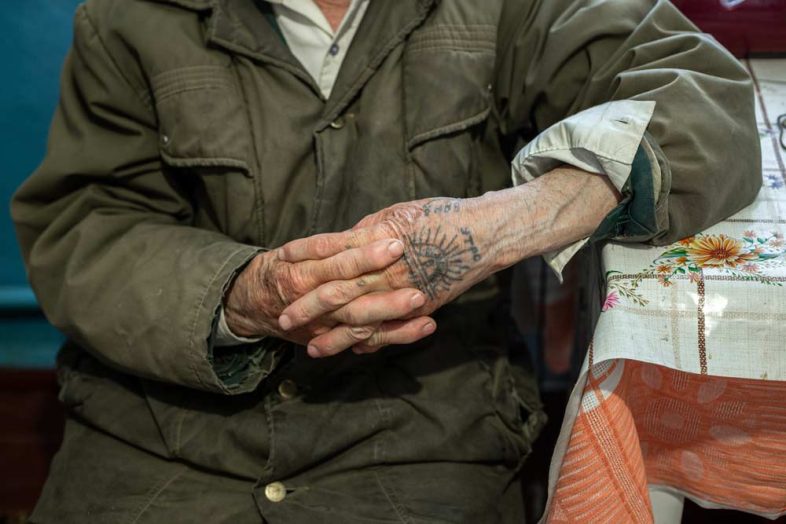
Photo: Polina Kovalska
Yanyk didn’t require clarity of awareness, defined relationships with relatives, or regular interactions. He was content with minimal change around him. Even during the full-scale Russian invasion, little altered in Grandpa’s life and consciousness. The family’s presence became more frequent, which seemed to please him as he would occasionally remark, “Good that everyone is here.” However, he rarely engaged in discussions on urgent matters, purchases, or daily routines, nor did he express much interest in others’ emotions. Instead, he retreated to his summer kitchen in the yard—a small extension with a Soviet-era kitchen, pantry, and a modest bedroom adorned in shades of blue rather than the opulent red of the main house.
Here, Grandpa savoured his snacks: pickles, sausage, and boiled eggs laid out on a plain table without a cloth, accompanied by moonshine in a simple, greenish glass. He claimed to enjoy the increased family visits and the comfort of his Soviet-era haven, finding solace in the familiar routines and moonshine-induced haze. Yet, there was a subtle change in him compared to before, and it was a positive shift.
In contrast to his wife, Yanyk appeared less nurturing and independent. They epitomised a traditional couple where shared thoughts, views, and behaviours defined their relationship. Such was the dynamic between Lina and Yanyk, reflective of past and even present norms.
Like in many similar relationships, as my dad recalls, Lina always exerted her influence with a strong-willed demeanour. Quick to anger and prone to drama, she insisted, for example, that my parents take my dad’s younger brother along on their honeymoon, arguing that “the child needs the sea.” After my parents married, she frequently visited my paternal grandmother and great-grandmother in the Yerusalymka area, criticising the lifestyle and opinions of everyone there. In her own neighbourhood of the Old Town, Lina had disputes with all the neighbours and avoided visiting them, as family members often recounted. From my own memories, I recall her critical attitude during a housewarming party at our new apartment, where nothing seemed to please her, not even the dishes. It was easy to understand why other relatives often remarked about Grandma Lina, “She won’t say a good word.”
Grandpa, on the other hand, always deferred to her. While some might fault him for passivity or lack of initiative, after his wife’s passing, he began to express himself more kindly—a shift that might sound surprising now. Yanyk gradually took on more responsibility for his own life, deciding when to go to the market, what to buy and cook for dinner, and when to tend to the garden. Even if Grandpa chose to drink during the day in his “time cabin,” it was now his own decision, as Grandma Lina had never allowed midday drinking.
Naturally, independent decision-making requires one’s own opinion. About a year after Lina’s funeral, when we invited Grandpa Yanyk to our place for Catholic Easter, it felt like his first visit to our apartment. As he sat at the table, he glanced around the living room, his gaze lingering on things that caught his interest, ready to inquire and offer praise.
“Ah, very good, very nice!”
His warmest compliments were reserved for the food, which delighted my mom in an unusually gratifying way. During our visits to his home, he would light up with joy when we told him pleasant news, like our family trips to nature or my successful defence of my bachelor’s thesis.
“Well done, well done!”
It turned out that Grandpa had a lot of kind words to share.
By the end of March 2022, our family had returned from Grandpa’s house to our apartment. Yana was still living with us, and we shared a large, soft grey sofa in the living room with white furniture, walls, and a carpet.
Instead of a conventional wall, my room had only windows—a wonderfully bright space for a photographer like me. However, during wartime in Ukraine, it posed a significant challenge.
Meanwhile, Mom and Dad occupied their relatively safe bedroom. Despite our apartment being on the seventh floor near the bridge and military hospital, we felt immense relief, even a touch of happiness, because we enjoyed modern comforts that Grandpa lacked: warmth, a microwave, a shower, and an indoor toilet. Although tension and anxiety lingered in Vinnytsia’s social atmosphere, it didn’t escalate to the point of preparing Molotov cocktails.
Suddenly, my dad’s phone rang—it was Grandpa. He recounted how he nearly poisoned himself with what he thought was “wine,” but fortunately, he decided to sniff the uncorked bottle before drinking from it. Only then did he realise it wasn’t wine at all and called to ask what to do with all the Molotov cocktails. We breathed a sigh of relief, knowing the explosive bottles were unnecessary and that Grandpa Yanyk hadn’t been killed, neither by his alcoholism, Second World War memories, or the onset of a full-scale invasion. Grandpa still had many good words left to share.

